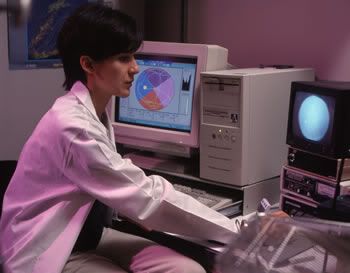
Intravenous secretin for autism spectrum disorder.
Source
Cochrane Database of Systematic Reviews. (3):CD003495, 2005.
Cochrane Database of Systematic Reviews. (3):CD003495, 2005.
BACKGROUND:
Secretin
Secretin is a 27 amino-acid polypeptide produced in the intestine. Its role in gastrointestinal function is well described. There is a postulated role in decreasing immune responses in the gut lumen. Secretin receptors have also been demonstrated in the brains of rats and pigs, but the exact role of secretin and of its mechanism of action in the central nervous system has not been determined. The behaviour of rats after secretin infusion has been studied. When injected intracerebrally, secretin decreased the locomotor activity of rats. However, there is uncertainty about the role of secretin in the human brain.
Secretin is a 27 amino-acid polypeptide produced in the intestine. Its role in gastrointestinal function is well described. There is a postulated role in decreasing immune responses in the gut lumen. Secretin receptors have also been demonstrated in the brains of rats and pigs, but the exact role of secretin and of its mechanism of action in the central nervous system has not been determined. The behaviour of rats after secretin infusion has been studied. When injected intracerebrally, secretin decreased the locomotor activity of rats. However, there is uncertainty about the role of secretin in the human brain.

Autism and secretin
Clinicians investigating children with a combination of gastrointestinal disorders and developmental symptoms of the type seen in autism noticed improvements in autism symptoms during their investigations. In a series of three cases the administration of porcine secretin during endoscopy was seen to positively affect the behaviour of children with autism. Improvements in eye contact, alertness and language were noted. The children had incidentally been given secretin during an endoscopic procedure. The study included some laboratory data suggesting physiological changes in some of these children. Since then the use of secretin has become widespread and it is currently being dispensed in many different forms and in countries where it is not licensed. To date, several controlled studies of the effectiveness of intravenous secretin have been completed. It is important to systematically review what has already occurred before expensive multi-centre trials are planned. This will determine if there is already sufficient evidence about effectiveness and explore the strengths and weaknesses of methodologies used to date.
Clinicians investigating children with a combination of gastrointestinal disorders and developmental symptoms of the type seen in autism noticed improvements in autism symptoms during their investigations. In a series of three cases the administration of porcine secretin during endoscopy was seen to positively affect the behaviour of children with autism. Improvements in eye contact, alertness and language were noted. The children had incidentally been given secretin during an endoscopic procedure. The study included some laboratory data suggesting physiological changes in some of these children. Since then the use of secretin has become widespread and it is currently being dispensed in many different forms and in countries where it is not licensed. To date, several controlled studies of the effectiveness of intravenous secretin have been completed. It is important to systematically review what has already occurred before expensive multi-centre trials are planned. This will determine if there is already sufficient evidence about effectiveness and explore the strengths and weaknesses of methodologies used to date.

OBJECTIVES:
To determine if intravenous secretin:
1. improves the core features of autism (social interaction, communication and behaviour problems);
2. improves the non-core aspects of behaviour or function such as self injurious behaviour;
3. improves the quality of life of affected individuals and their carers;
4. has short term and long term effects on outcome;
5. causes harm. 

CONCLUSIONS:
There is no evidence that single or multiple dose intravenous secretin is effective and as such it should not currently be recommended or administered as a treatment for autism. Further experimental assessment of secretin's effectiveness for autism can only be justified if methodological problems of existing research can be overcome.




0 Comments:
Post a Comment
<< Home